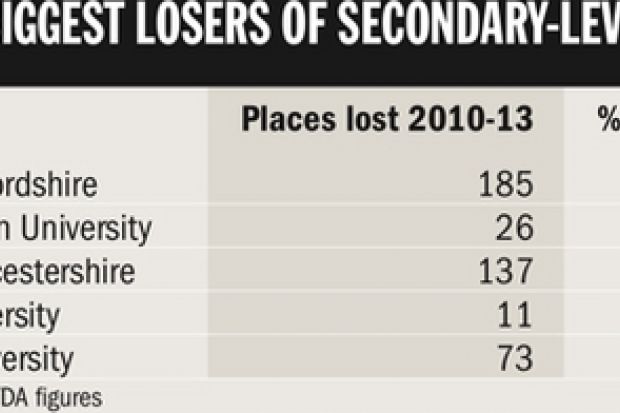Universities may have to "consider their involvement" in the provision of initial teacher training (ITT) following cuts to places at secondary-school level and a new focus on school-led training, the Training and Development Agency for Schools has said.
An analysis by Times Higher Education shows that the sector has lost 13.5 per cent of its places for ITT provision, across primary and secondary levels, since the coalition government came to power in May 2010.
Excluding the new School Direct scheme (which allows schools to select for vacancies trainees who would be trained in partnership with an ITT provider) and those on a Graduate Teacher Programme, 35.4 per cent of secondary training places in higher education have been lost between the academic years 2010-11 and 2012-13.
Les Ebdon, vice-chancellor of the University of Bedfordshire, said: "The big issue is that the cuts we have received will make a number of [teacher training] subjects no longer viable because we've been cut to below 10 [places], which even the TDA says is the number of viability. We're looking at whether we can swap numbers with other providers so that we can establish viable cohorts in key subject areas, but it's not a transparent process."
James Noble-Rogers, chief executive of the Universities' Council for the Education of Teachers (Ucet), said that the small cohorts of secondary-school allocations were a cause for concern.
Ucet is worried about "high-quality university infrastructure being lost for ever" if departments are forced to close, he added.
Ucet will help to arrange the sharing of places for the next academic year so that places will be protected, Mr Noble-Rogers said.
In the TDA's allocations letter to ITT providers, Tom Glover, director of funding and market management, writes: "The reduction in secondary places and the [Department for Education's] strategy to increase school-led provision may result in some providers having to consider their involvement in initial teacher training. In particular there are a number of cohorts that have been identified as potentially unviable due to their small size."
The University of Southampton, which has lost more than a third of its places over the past two years, is one institution that has specifically asked for its places to be cut in order to focus on "flexible partnerships" with schools.
A Department for Education spokesman said that universities played a "vital role" in teacher training and insisted that the sector would continue to do so.
"Pupil numbers are falling sharply in secondary schools, so it's common sense that the number of new teachers required also declines - the taxpayer would rightly ask questions if we continued to train people who had no jobs to go to," he said.
However, Professor Ebdon disagreed with that assessment. "People may ask where the Secretary of State [Michael Gove] has been for the past 10 years if he thinks there is an oversupply of secondary-school teachers," he said. "That's certainly not what I hear from head teachers."
sarah.cunnane@tsleducation.com.
Register to continue
Why register?
- Registration is free and only takes a moment
- Once registered, you can read 3 articles a month
- Sign up for our newsletter
Subscribe
Or subscribe for unlimited access to:
- Unlimited access to news, views, insights & reviews
- Digital editions
- Digital access to THE’s university and college rankings analysis
Already registered or a current subscriber?
